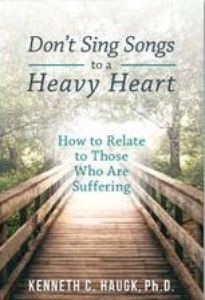Book Review: Don't sing songs to a heavy heart. How to relate to those who are suffering
<- Back
Don't sing songs to a heavy heart. How to relate to those who are suffering
Book Author: Kenneth C Haugk
Review Author: Alice
Armadale Free Reformed Church
Pro Ecclesia Bookshop
As humans we are inclined to be quick with solutions and/or stories of our own pain and suffering when we hear about the struggles of others. While this isn't in and of itself wrong, it can be detrimental to the sufferers who usually just need a listening ear.
Many sufferers have common feedback when it comes to helpful or hurtful encounters from well-meaning friends, neighbours or relatives. Even church leaders often get it wrong; cliches and dismissive words being some of the easiest mistakes to make. For example, telling a mother who had a miscarriage 'you can always try for another' or to someone who has just lost a parent who passed the age of 80 'they lived a long and full life'. While these things may be true they are not comforting or even helpful for the sufferer, especially not in the moment.
There are a number of elements that shape a person's ability to cope and their tenacity in a situation. We need to take care not to view others through the sole lens of our own experiences and instead take the time to unravel and learn the sufferers unique experience and how it has shaped them. How they grew up and their family standards, spiritual beliefs and life experiences (or lack thereof.) By doing this we can get outside of ourselves and our own preconceived notions about how the suffering person should respond. This is usually not easy.
There are some useful lists and summaries within the book. The pages 41-42 offer a good guide for when extra patience or long-term care may be needed and Chapter 9 provides a comprehensive explanation of things we ought not to say, as they are commonly found to be hurtful not helpful.
At the end of the book practical ways to help are listed such as when and how to offer help with household chores or providing meals. There are reminders to ask after the sufferer but also those directly affected by their suffering, as they are often overlooked. For example, the children of parents who have had a miscarriage. Or the wife of a man who has lost his job.
There are a few instances in the book where the writer uses language that we as Free Reformed Christians would not use. On page 44 the author writes, ''You bring Jesus, and you bring yourself. That means Jesus incarnates Himself in you” in regard to helping someone who is suffering. Again, on page 50 Haugk describes our own human presence as incarnation. I'm not sure what the writer means by this. Perhaps attempting to describe how the Holy Spirit works within and through us for God’s glory and for the benefit of His people.
All in all this book is a useful and practical guide to assist us in showing Christian love and care to our neighbour and at the same time provides sound advice on what to avoid and when. As is quoted on page 10,
Helping
And some kind of help
Is the kind of help
That helping's all about
And some kind of help
Is the kind of help
We all can do without.
Shel Silverstein

